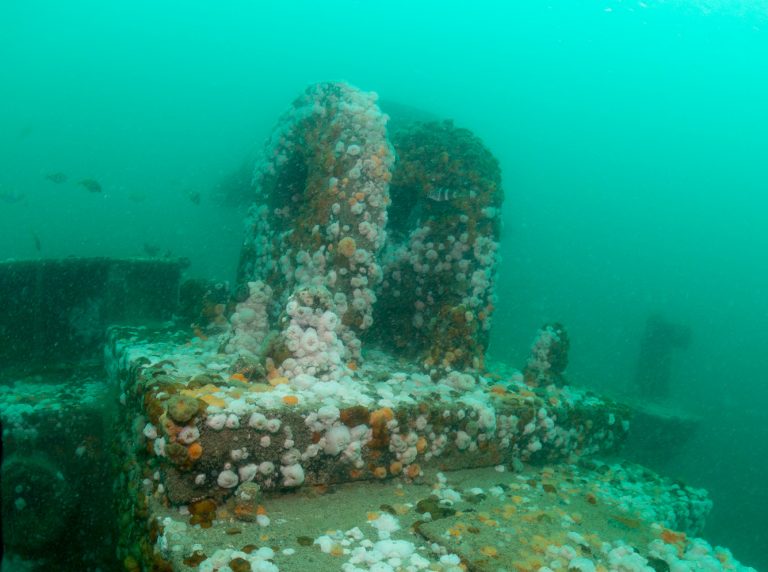The 17th Ronald C. Baird Sea Grant Science Symposium on offshore renewable energy featured presentations by industry experts worldwide to provide a forum for researchers, resource managers, and stakeholders to discuss the most current science in various areas important to Rhode Island coastal communities and coastal and ocean environments.
For more information about the symposium, go here: https://seagrant.gso.uri.edu/special-programs/baird/
Watch the Recorded Sessions
Webinar partners — URI CRC, Rhode Island Sea Grant, URI Graduate School of Oceanography, District Hall/Venture Cafe Providence, and the International Council for the Exploration of the Sea (ICES) and Working Group on Marine Benthal and Renewable Energy Developments (WGMBRED)
Offshore Renewable Energy in the US: Learning as We Go
Session #1: Offshore Renewable Energy in the U.S. — May 19th
What we have learned from a regulatory, industry, and resource user perspective.
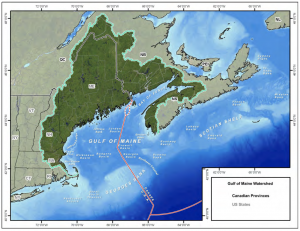 Read the story or view the recorded webinar
Read the story or view the recorded webinar
The Presenters:
Mary C. Boatman, Ph.D., serves as the Environmental Studies Chief for the Office of Renewable Energy Programs within the Bureau of Ocean Energy Management (BOEM). She coordinates the scientific studies funded by BOEM and communication about those studies. She participated in regional ocean planning and support for sharing scientific information in regional data portals. Her area of expertise is chemical oceanography, but she has worked in a multi-disciplinary capacity at BOEM.
Annie Hawkins is the Executive Director of the Responsible Offshore Development Alliance (RODA). Prior to joining RODA, she provided government relations support to a variety of fishing industry and ocean technology clients with a Washington, D.C. law firm. She previously held positions in fisheries management and marine regulation including at the New England Fishery Management Council and NOAA’s Large Marine Ecosystems program.
Grover Fugate is the Executive Director of the Coastal Resources Management Council. Fugate has led the development and implementation of the Rhode Island Ocean SAMP, including leading the permitting process for the Block Island Wind Farm and Vineyard Wind.
John O’Keeffe is Director of U.S. Marine Affairs for Ørsted U.S and previously served as manager of operations and maintenance for the Block Island Wind Farm, before Deepwater Wind’s acquisition by Ørsted.
Moderated by:
Jennifer McCann is the Director of U.S. Coastal Programs at the University of Rhode Island Coastal Resources Center at the Graduate School of Oceanography and Director of Extension Programs for the Rhode Island Sea Grant College Program. McCann served as URI’s lead for developing the Ocean SAMP.
Erik Chapman is the Director of New Hampshire Sea Grant and the Associate Director of Outreach for the UNH School of Marine Science and Ocean Engineering. He has a Masters in Wildlife Ecology and a Ph.D. in Oceanography and his expertise is in developing and using ecosystem models: an approach he has used to explore factors influencing Adèlie Penguin reproductive energetics and life history characteristics of bluefin tuna. He is currently the Chair of the NH Commission on Coastal and Marine Natural Resources and the Environment, a member of the Sea Grant Association Board, and a member of the NOAA Ecosystem Science Management Working Group.
Session #2: Changes in Habitats and Ecosystems — June 15th
An explanation of the changes in the biological diversity and ecological interactions that result from the construction of offshore renewable energy structures at a local scale and beyond.
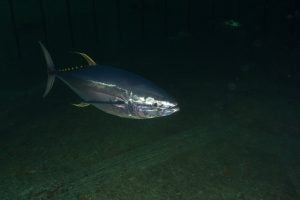 Read the story or view the webinar recording
Read the story or view the webinar recording
The Presenters:
Jan Vanaverbeke is a senior scientist at the Royal Belgian Institute for Natural Sciences, Operational Directorate Natural Environment, Marine Ecology and Management Group, and a visiting professor at Ghent University, Belgium. His research is directed towards understanding the functional effects of the introduction of artificial hard substrates in the marine environment. Currently, he is acting as one of the chairs of the ICES Working Group on Marine Benthal Renewable Energy Developments (ICES WGMBRED).
Emma Sheehan is a Senior Research Fellow at the School of Biological and Marine Sciences and Faculty of Science and Engineering at the University of Plymouth, United Kingdom. Dr. Sheehan currently leads a research group www.sheehanresearchgroup.com that utilizes non-destructive techniques to assess the effectiveness of spatial management for species and habitats over large spatial and temporal scales.
Julia Livermore is a supervising biologist with the Rhode Island Department of Environmental Management’s (RIDEM) Division of Marine Fisheries; she serves as the point person on offshore wind for the Division. During her time at RIDEM, Julia has reviewed biological monitoring data from the Block Island Wind Farm and has conducted a spatiotemporal analysis of offshore fishing activity and location and value of landings from federal wind energy areas to characterize how regions slated for development are utilized by Southern New England fishermen, as well as the species they target.
David Bethoney serves as the Executive Director of the Commercial Fisheries Research Foundation. Prior to joining the Foundation, David was a Research Assistant Professor at the University of Massachusetts Dartmouth, School for Marine Science & Technology where he developed a research program on the foundation of practical application and direct engagement with the fishing industry. As part of that program, he studied benthic animal communities and habitats in areas of meters to tens of thousands of kilometers, regions as different as mid-coast Maine and off the coast of Argentina, and topics as varied as sea cucumber fisheries management and the impact of offshore windfarm development.
Moderated by:
Jennifer McCann is the Director of U.S. Coastal Programs at the University of Rhode Island Coastal Resources Center at the Graduate School of Oceanography and Director of Extension Programs for the Rhode Island Sea Grant College Program. McCann served as URI’s lead for developing the Ocean SAMP.
Andrew Lipsky is the Fisheries & Offshore Wind Lead at NOAA’s Northeast Fisheries Science Center in Woods Hole, MA and Narragansett, RI. He is responsible for developing NOAA’s regional fisheries and wind science capabilities. Lipsky also co-chairs the new ICES Working Group on Offshore Wind Development and Fisheries.
Session #3: Learning from the BIWF: Sediment and Sound — July 21st
Researchers present findings about acoustical and benthic habitat data from the area of the Block Island Wind Farm.
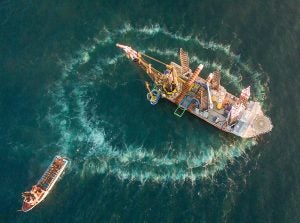
Image courtesy of https://www.hydrotechnik-luebeck.de/
Read the story or view the recorded webinar
Presenters:
Jennifer Amaral earned her B.S. and M.S. degrees in ocean engineering from the University of Rhode Island and is currently studying towards her Ph.D. in the same discipline. Her doctoral research involves the study of impact pile driving sounds during the installation of offshore wind turbines. She is a lead scientist and engineer with Marine Acoustics, Inc. in Middletown, Rhode Island, where she implements modeling strategies and develops acoustic assessment tools to evaluate underwater sound propagation.
Monique LaFrance Bartley is a marine ecologist with the National Park Service in the Ocean and Coastal Resources Branch. She earned a B.S. at the University of Rhode Island, majoring in marine biology and minoring in marine affairs and underwater archaeology. She continued her studies at the Graduate School of Oceanography at URI, earning her M.S. and Ph.D. degrees in oceanography. Dr. LaFrance Bartley’s primary research focus is benthic habitat mapping to establish baseline conditions and monitoring to assess change over time, with the purpose of providing results that support real-world management applications.
Discussion Participants:
James Boyd is a coastal policy analyst for the Rhode Island Coastal Resources Management Council (CRMC) and has been with the agency for 20 years. He is primarily responsible for the development and implementation of the CRMC’s coastal policies and regulations, and he manages and develops the CRMC’s federal consistency decisions for offshore renewable energy projects. Prior to working for the CRMC, he was a commercial fisherman for a decade.
Dave Monti is a charter captain, fishing writer and fish advocate. He is vice-chair of the RI Marine Fisheries Council, 2nd vice president of the RI Saltwater Anglers Association, a board member of the American Saltwater Guides Association and a member of the RI Party & Charter Boat Association. He is the Providence Journal’s fishing writer and writes for 12 other fishing related blogs, magazines, and newspapers often writing about climate change and its impact on fish, offshore wind farms, and fish policy at the state and national level.
Moderated by:
Jennifer McCann is the Director of U.S. Coastal Programs at the University of Rhode Island Coastal Resources Center at the Graduate School of Oceanography and Director of Extension Programs for the Rhode Island Sea Grant College Program. McCann served as URI’s lead for developing the Ocean SAMP.
Zoë Hutchison is a postdoctoral research fellow at the URI Graduate School of Oceanography. She earned her B.Sc. in Marine Biology at the University of Plymouth in 2008, and her M.Sc. in Aquatic Resource Management at King’s College London in 2010. She completed her Ph.D. in Marine Science in 2015, at the Scottish Association for Marine Science in conjunction with the University of Aberdeen. Dr. Hutchison’s work is primarily centered around the effects of EMF and benthic effects at the Block Island Wind Farm.
Session #4: Effects on the Food Web — September 23rd
Researchers will present from an ecological perspective how the changes created by offshore wind development affect the food web, with a focus on how this relates to fish as key elements in the food web. A bottom-up perspective, will link how habitats and food web changes, including links to migration, reproduction, and species composition.
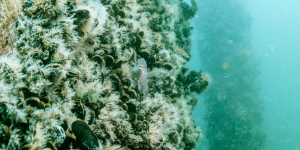
Read the story or view the recorded webinar.
The Presenters:
Andrew Gill is a Principal Scientist at the Centre for Environment, Fisheries, and
Aquaculture Science in United Kingdom.
Jennifer Dannheim is a researcher at the Alfred Wegener Institute Helmholtz Centre for Polar and Marine Research in Germany. She is also a Delegate of the ICES Working Group on Marine Benthal and Renewable Energy Developments (WGMBRED) and ICES Benthos Ecology Working Group (BEWG).
George A. Maynard is the Policy and Research Coordinator at the Cape Cod Commercial Fishermen’s Alliance.
Dave Stevenson is the Fishery Management Council Coordinator of the Habitat and Ecosystem Services Division at the National Oceanic and Atmospheric Administration (NOAA).
Moderated by:
Jennifer McCann is the Director of U.S. Coastal Programs at the University of Rhode Island Coastal Resources Center at the Graduate School of Oceanography and Director of Extension Programs for the Rhode Island Sea Grant College Program. McCann served as URI’s lead for developing the Ocean SAMP.
Elizabeth T. Methratta is a Principal Scientist at NOAA National Marine Fisheries Service, Northeast Fisheries Science Center.
Session #5: Effects of Noise and EMF on Benthic Communities — October 20th
Assessment of the influence of noise and EMF (energy emission) on benthic communities at a local and larger ecosystem scale during pre-construction, construction, in the operational phase and in relation to decommissioning. The key elements of energy emission that need to be considered will be discussed. The current status of knowledge will be referred to and where relevant, techniques to reduce energy emissions will be highlighted, including any known limitations in relation to the benthic receptors (including different life stages where possible).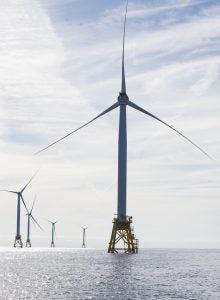 View the recording. Read the story.
View the recording. Read the story.
The Presenters:
Sofie Van Parijs is the Passive Acoustic Program Lead at the NOAA National Marine Fisheries Service for the Northeast Fisheries Science Center.
Louise Roberts is a Postdoctoral Research Associate in the College of Agriculture and Life Sciences at Cornell University.
Zoë Hutchison is a postdoctoral research fellow at the URI Graduate School of Oceanography. She earned her B.Sc. in Marine Biology at the University of Plymouth in 2008, and her M.Sc. in Aquatic Resource Management at King’s College London in 2010. She completed her Ph.D. in Marine Science in 2015, at the Scottish Association for Marine Science in conjunction with the University of Aberdeen. Dr. Hutchison’s work is primarily centered around the effects of EMF and benthic effects at the Block Island Wind Farm.
Peter Sigray is a Researcher at the Royal Institute of Technology (KTH) in Stockholm, Sweden.
Sherryll Huber Jones is the New York State Ocean Coordinator for the New York State Department of Environmental Conservation Division of Marine Resources.
Moderated by:
Jennifer McCann is the Director of U.S. Coastal Programs at the University of Rhode Island Coastal Resources Center at the Graduate School of Oceanography and Director of Extension Programs for the Rhode Island Sea Grant College Program. McCann served as URI’s lead for developing the Ocean SAMP.

